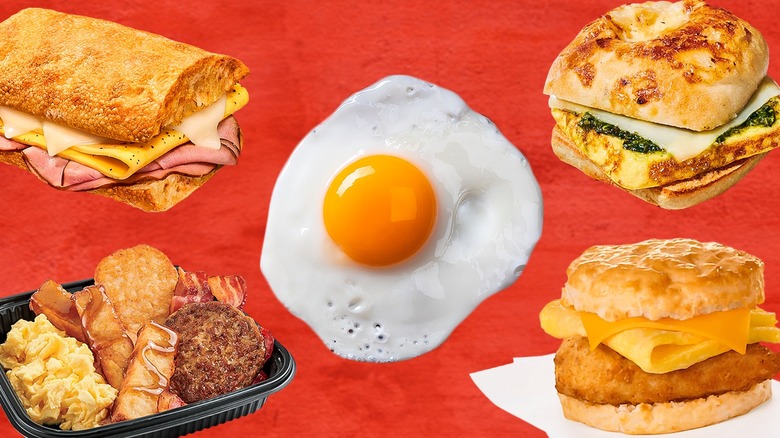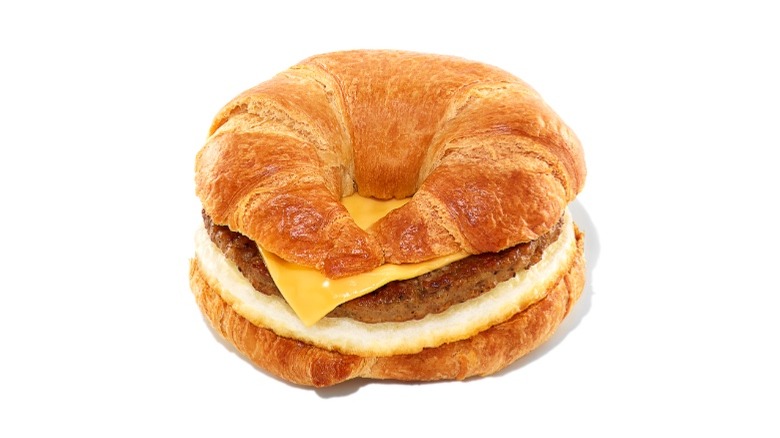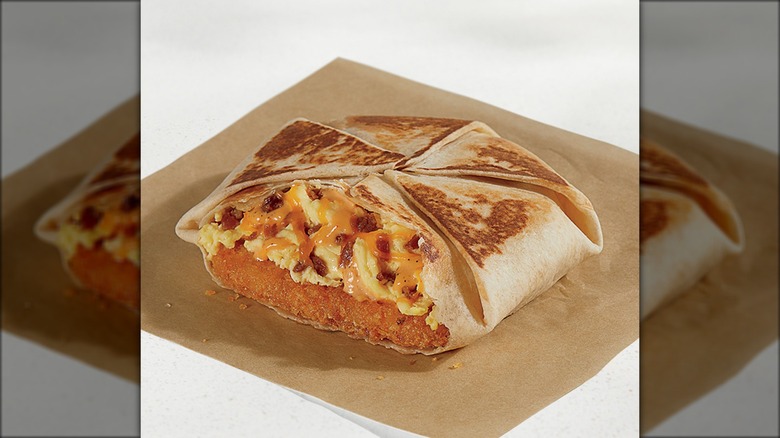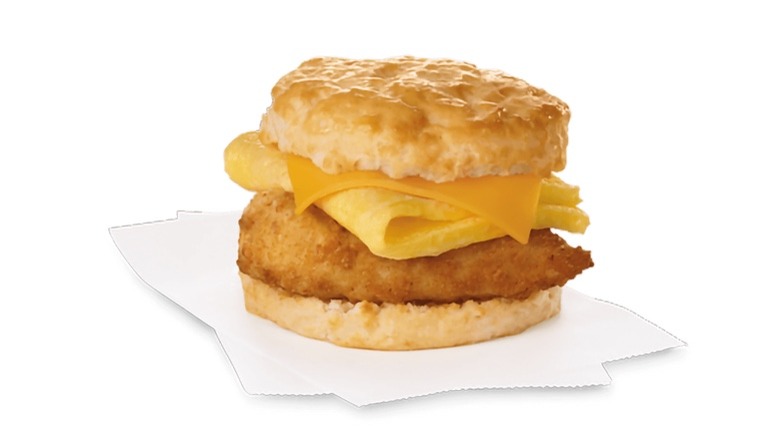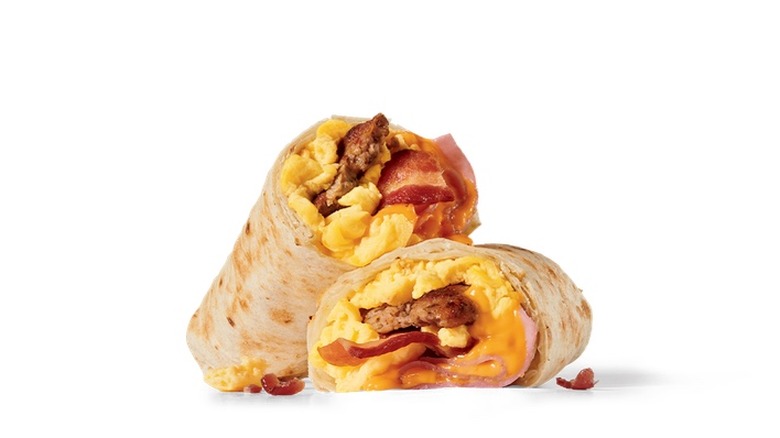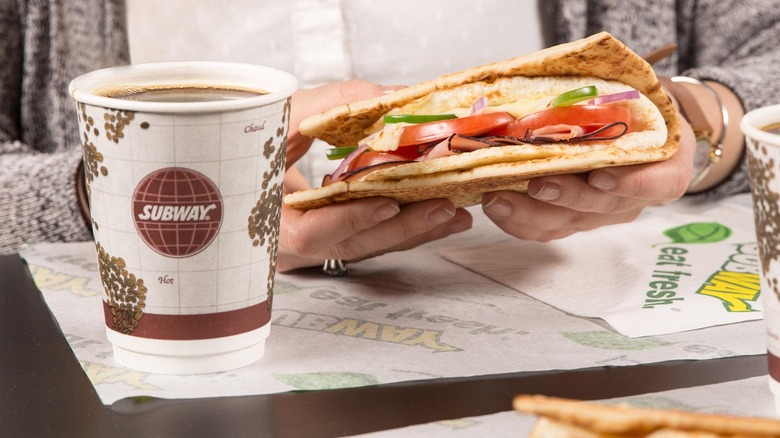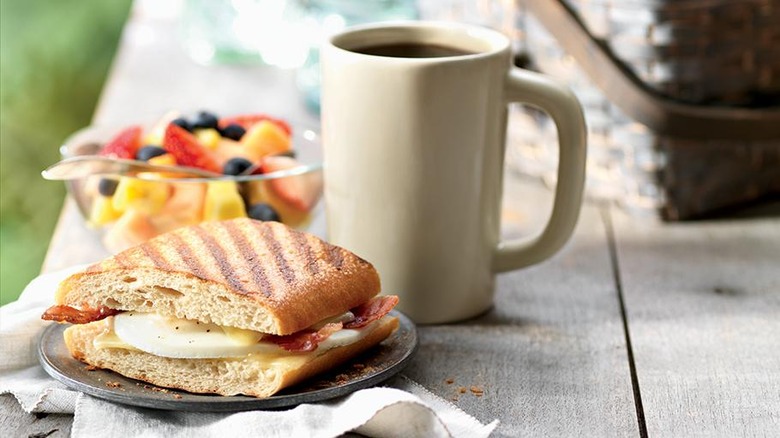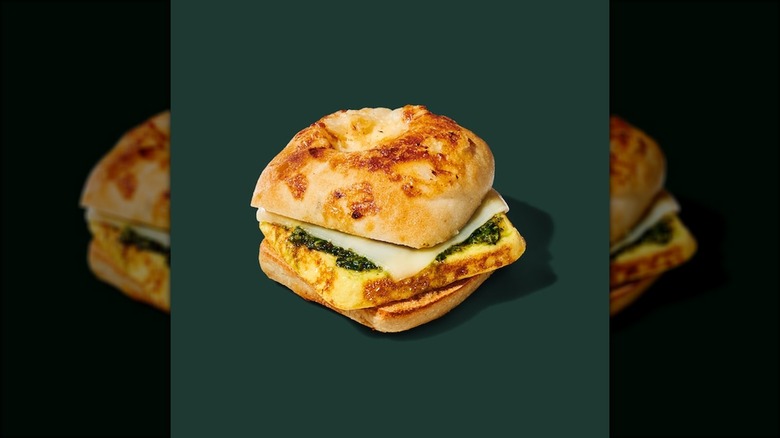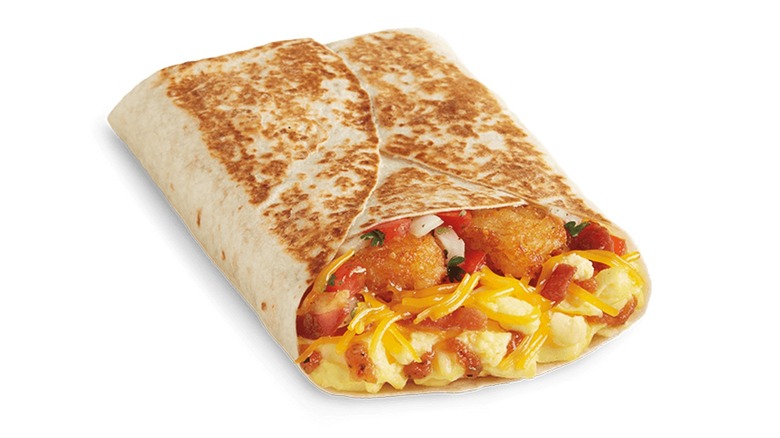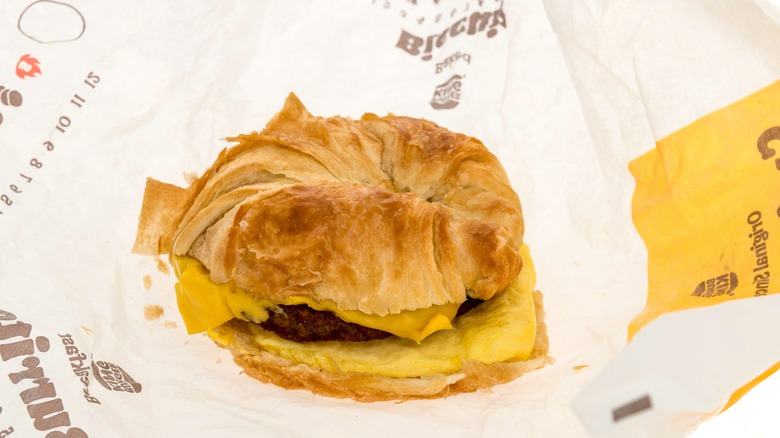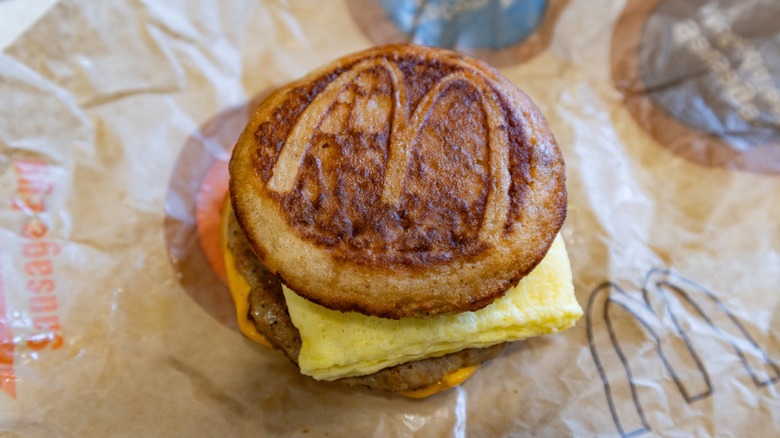Fast Food Chains That Don't Serve Real Whole Eggs
When you see eggs on the menu somewhere, it shouldn't be too much of a stretch to imagine that you're getting, well, eggs. If you're ordering at a fast food joint, however, that may not always be the case. For the sake of cost and efficiency, multiple chains opt for pre-made mixtures that may indeed contain egg, but also hold a bunch of other ingredients — in some cases, we uncovered mixtures with well over a dozen components — that definitely do not come straight from the chicken.
Said ingredients are typically a mixture of fillers and preservatives, added by fast food restaurants to extend the shelf-life of a product and to ensure the consistency of their eggs. By contrast, some businesses, such as Tim Hortons, have taken a firm stance against these concoctions over the years. The Canadian coffee chain vowed to only use freshly cracked eggs in 2021 as a part of a larger mission to improve the quality of its menu.
But not all fast food restaurants are on the same page. In fact, you may be surprised by just how many of your go-to breakfast spots are serving up something like but not quite the same as whole eggs. If unadulterated eggs are what you're after come sunrise, these are the fast food chains you may want to avoid in the future.
1. Dunkin'
Dunkin' only dropped the "Donuts" part of its name in 2018, but it expanded its horizons beyond sugary baked goods well before that. The chain added its first breakfast sandwiches to the menu in 1997, and while the offerings have changed somewhat over the years, they remain among the most popular items at Dunkin'.
If your go-to breakfast sandwich contains egg, however, you may want to read this before placing your next order. While surely nobody expects the fare at Dunkin' to be preservative-free, the egg patties used in the likes of its Sourdough Breakfast Sandwich and Turkey Sausage, Egg & Cheese may still surprise you. Each patty contains a whopping 10 ingredients, with the expected egg whites and egg yolks dragged down by soybean oil, water, corn starch, salt, natural flavor, xanthan gum, cellulose gum, and citric acid (we dare you to find all of those in your kitchen).
Yet this list used to be a lot longer. In 2016, the chain decided to cut some ingredients in its egg patties and use fewer fillers and more egg. "The yolk is much fuller, it looks much more yellow," Nigel Travis, the then-CEO of Dunkin' Brands, promised FOX News. At this point, egg yolks were the third ingredient in the list, meaning there was more water in each patty than actual yolk, while the rest of the list was bulked out with over a dozen additional ingredients.
2. Taco Bell
We'll be the first to admit that Taco Bell breakfast is pretty darn good. We dare any non-believers to sample the Breakfast Crunchwrap, look us in the eyes, and tell us otherwise. Passionate though we are about eggs, meat, cheese, and a full hash brown parceled in a hexagonal tortilla bun, we will admit that the eggs do give us pause — namely because they're far from just eggs.
Back in 2015, Taco Bell removed all artificial flavors and colors, added trans-fat, high fructose corn syrup, and unsustainable palm oil from its core menu items. Three years later, it removed preservatives and other additives where deemed possible. It seems as if this wasn't totally possible with the breakfast menu as, while Taco Bell uses 100% cage-free whole eggs, these are combined with soybean oil, salt, citric acid, pepper, sunflower oil, flavors, xanthan gum, and guar gum.
Some of these ingredients, like salt and pepper, are standard additions, so we'll give them a pass. However, the likes of xanthan gum — a fermented sugar often used as a thickener and sometimes substituted for eggs in gluten-free baked goods and sauces — is a little harder to justify. While not considered dangerous by the FDA, those who are trying to avoid additives as much as possible may want to look elsewhere for a fast food breakfast. The Breakfast Crunchwrap isn't the only menu item affected, either. You'll also find these egg patties in Taco Bell's Breakfast Burritos and Quesadillas.
3. Chick-fil-A
Chick-fil-A currently only serves breakfast until 10.30 a.m., so you'll need to move fast if you want to sample its biscuits or muffins. If you're looking for real whole eggs, however, you may wish to move even faster in the opposite direction, because Chick-fil-A is not the breakfast spot for you.
Delicious though its breakfast biscuits may be (the Spicy Chicken Biscuit is a particular highlight), those menu items that contain eggs — such as the Chicken, Egg & Cheese Biscuit — are a playground of preservatives, additives, and fillers. The ingredients list for each folded egg reads as follows: whole eggs, water, salt, butter type flavor (medium chain triglycerides, coconut oil, natural flavors), xanthan gum, citric acid, annatto, soybean oil, palm kernel oil, soy lecithin, natural flavor, and beta carotene. The latter is used as a coloring agent, giving the egg its distinctive yellow hue (also known as the same color as if you just used plain ol' whole eggs).
None of these ingredients are overly concerning. Our biggest critique would be that several on the list, such as the palm kernel oil and coconut oil, are notably high in saturated fats, which doesn't exactly work wonders on each breakfast sandwich's nutritional profile. More than anything, it's just frustrating to see flavors added to eggs — a food that is already packed with plenty of natural flavor — for what we assume is an effort to make whipping up each morning's meal as cheap and quick as possible.
4. Jack in the Box
To give credit where it's due, there are two things we need to highlight about Jack in the Box. Not only does the fast food chain serve breakfast all day long (as every restaurant should, hint, hint), but it also uses real whole eggs in multiple menu items. The likes of its Sausage, Egg & Cheese Biscuit, Supreme Sourdough Breakfast Sandwich, and the Sausage Breakfast Jack all currently use freshly cracked USDA Grade AA eggs. Admittedly, these are fried in a butter-flavored vegetable oil, which does inevitably end up in the egg once it's all cooked, but that's something we consider to be a relatively small caveat.
What isn't quite as wholesome is any Jack in the Box breakfast item that contains scrambled eggs. While the first ingredient in this concoction is whole eggs, the rest of each portion is bulked out with water (which makes up 19% of each serving), egg whites, salt, xanthan gum, citric acid, annatto (for color, because apparently eggs don't have enough of that), and butter flavor (consisting of sunflower oil, natural flavors, and medium chain triglycerides). You'll find these eggs in menu items such as the French Toast Sticks Platter – which combines the sweet fried bread with eggs and a hefty helping of bacon, sausage, and a hash brown — and the Meat Lovers Breakfast Burrito.
5. Subway
As of 2021, Subway is no longer the biggest restaurant chain in the world — a title it held since 2011 — having been pipped to the gold by McDonald's. That's still no small feat, with nearly 37,000 locations dotted across the globe to feed your carb cravings at any time of day, including breakfast. But before you dash to your nearest of these restaurants, we feel that it's our obligation to warn you about the eggs. Back in 2012, Forbes compared eggs at various fast food restaurants and found that Subway's contained the most non-egg ingredients.
Fast forward over a decade and things haven't got much better. While the eggs served at Subway restaurants don't contain the likes of TBHQ, propylene glycol, or isolated pea product like they did in the past, they still contain a multitude of additives and preservatives that you may wish to avoid. If you order one of the three breakfast sandwiches (currently, these are the Bacon, Egg & Cheese; Ham, Egg & Cheese; or Egg & Cheese) you'll be chowing down on a mix of egg whites, egg yolks, soybean oil, water, unmodified corn starch, liquid butter alternative (liquid and hydrogenated soybean oil, salt, soy lecithin, natural flavor, tocopherols, salt, black pepper, xanthan gum, cellulose gum, and citric acid.
None of these are particularly out of the ordinary for a fast food restaurant's eggs, but that doesn't make it any less surprising to see something so simple made with so many ingredients.
6. Panera Bread
Panera Bread has been pretty vocal about its passion for real eggs in the past. In 2018, it made a thinly veiled dig at the breakfasts offered by some of its competitors when it petitioned the FDA to officially define the term "egg" so other outlets couldn't list eggs made with additives, preservatives, or colors as such. Conveniently, this came just as Panera Bread launched its own line of breakfast sandwiches, which — you guessed it — were proudly marketed as containing real, whole eggs.
"Panera and our competitors use the FDA definitions to guide our product descriptions and names," Sara Burnett, Panera Bread's then-Director of Wellness and Food Policy, said at the time in a press release. "But in the case of 'eggs,' we have no guidance. Brands can say they offer an egg sandwich, but sell an egg product that contains multiple additives. At Panera, consumers can be assured that when they order eggs, that's exactly what they're getting."
Except ... not exactly. That may have been the case in 2018, but while several Panera Bread menu items do use real whole eggs in 2024, others contain scrambled eggs — such as the Ciabatta Ham, Egg & Cheese Sandwich and CinnaScramble — that are actually made with liquid eggs. These are far from the most complicated eggs on this list, consisting of whole eggs, citric acid, and canola oil, but they're still not the real whole eggs Panera Bread once so proudly proclaimed to serve.
7. Starbucks
The Starbucks breakfast menu currently contains an impressive array of nine different sandwiches, none of which contain real whole eggs. Depending on the sandwich you pick, you'll be treated to an egg patty containing varyingly long lists of ingredients. For example, the Egg, Pesto & Mozzarella Sandwich uses an egg frittata patty that deploys eggs mixed with the likes of unmodified corn starch, mirin (rice wine), natural ginger flavor, and soy type flavor.
If you opt for the Bacon, Gouda & Egg Sandwich (which Mashed once ranked as the best of Starbucks' breakfast offerings), you'll get an egg frittata patty with cheese, which contains far more ingredients than we'd care to list thanks to the addition of cheese as well as egg. Meanwhile, the Chicken, Maple Butter & Egg Sandwich uses a puffed scrambled egg patty that contains ingredients such as nonfat milk, soybean oil, dicalcium phosphate, salt, sodium bicarbonate, and butter flavor.
If you're really determined to find whole eggs (or as close to whole eggs as you can get at Starbucks), a slightly less complicated choice is one of the Starbucks Protein Boxes. These contain hard-boiled eggs, with the only other ingredient being citric acid. Both the Kale & Mushroom Egg Bites and Bacon & Gruyère Egg Bites are also made with a relatively simple egg concoction (eggs, water, and citric acid). As an aside, most Starbucks food is delivered frozen, so if you want something fresh, you'll likely need to look elsewhere.
8. Del Taco
Del Taco has a stellar lineup of burritos, tacos, and wraps and clearly understands that carbs and copious amounts of cheese are key to a hearty, indulgent breakfast. (For future reference, our favorite is the Hashbrowns & Bacon Breakfast Taco). No matter which item you choose, every option on Del Taco's breakfast menu uses scrambled egg as the base for all this cheesy goodness. However, this is another fast food chain that doesn't use straight-up eggs in any of its dishes. Instead, it uses our old friend, liquid eggs.
This time around, a hefty 19% of each liquid egg serving is made up of water. The rest of the mixture consists of whole eggs, egg whites, salt, xantham gum, citric acid, annatto, and butter flavor (sunflower oil, natural flavors, medium chain triglycerides). The latter crops up a lot in fast food eggs and sound much more alarming than they really are. In essence, medium chain triglycerides (MCTs) are just fats made from coconut and palm kernel oils and have actually been linked to weight loss in the past.
That doesn't make a Del Taco Breakfast Toasted Wrap a health food (far from it — there are up to 1,150 milligrams of salt and 21 grams of fat in each wrap), but it's still interesting to note for the next time you're checking what's in a restaurant's faux-eggs.
9. Burger King
Burger King was an early adopter of the fast food breakfast, introducing its Croissan'wich (a croissant stuffed with meat, eggs, and cheese, like a sandwich) in 1983 as a very transparent attempt to compete with the McDonald's McMuffin. Heck, one of its most famous ads from the 1980s even saw a group of children creepily singing their apologies that the "Croissan'wich beat the stuffin' out of Egg McMuffin."
The Croissan'wich lives on to this day, with the Burger King breakfast menu also expanded to include the likes of biscuits and breakfast burritos — most of which are stacked with eggs. Or, well, "eggs." Burger King uses a "liquid egg-pasteurized mixture" for its morning meals. The ingredients list starts with whole eggs, then goes on to add the usual suspects such as water, xanthan gum, citric acid, and medium chain triglycerides. It's not the longest list of ingredients we've ever seen for a fast food egg, but it's definitely a stretch to say that these are real, whole eggs.
These eggs have caused some commotion in the past, with customers flocking to Reddit and other parts of the internet to complain about the rather gross-looking air pockets that form when the mixture is cooked. However, as others have pointed out, these bubbles are hard to avoid when cooking liquid eggs, Burger King or not. The more you know...
10. McDonald's
Oh, McDonald's, widely recognized as the fast food breakfast king. Whether you're pulling up at the drive-thru for a Bacon, Egg & Cheese McGriddle or punching in a DoorDash order for a Sausage, Egg & Cheese Biscuit, Micky D's has got your back (and your stomach) when you wake up craving a greasy, carby, indulgent morning meal. Our only real gripe is that it doesn't serve breakfast all day long anymore, with the chain dropping the initiative during the COVID-19 pandemic.
Okay, perhaps that isn't our only issue. McDonald's is extremely loud and proud about the fact it uses real eggs for its breakfast items. While it's true that some items, like the chain's McMuffins, use freshly cracked eggs that are cooked in a metal ring to match the shape of the bread, others do not. For example, if you order the Bacon, Egg and Cheese Biscuit, you'll be getting a folded egg made of eggs, nonfat milk, modified food starch, and citric acid. These are pre-cooked, folded, and flash frozen by the supplier, before being recooked on each restaurant's grill. The same is true for any biscuit and McGriddle containing eggs.
Any dish containing scrambled eggs, such as the Big Breakfast, also bends the definition of "real eggs." These are made with liquid eggs containing citric acid. Likewise, the eggs in the Sausage Burrito are pre-cooked liquid eggs mixed with a mix of sausage and vegetables, as well additives such as dextrose, calcium chloride, and xanthan gum.
